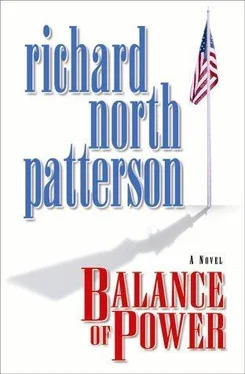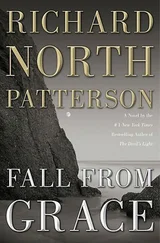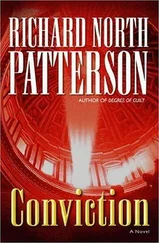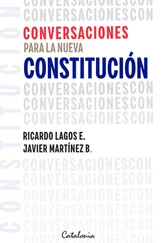Richard Patterson - Balance of Power
Здесь есть возможность читать онлайн «Richard Patterson - Balance of Power» весь текст электронной книги совершенно бесплатно (целиком полную версию без сокращений). В некоторых случаях можно слушать аудио, скачать через торрент в формате fb2 и присутствует краткое содержание. Жанр: Старинная литература, на английском языке. Описание произведения, (предисловие) а так же отзывы посетителей доступны на портале библиотеки ЛибКат.
- Название:Balance of Power
- Автор:
- Жанр:
- Год:неизвестен
- ISBN:нет данных
- Рейтинг книги:5 / 5. Голосов: 1
-
Избранное:Добавить в избранное
- Отзывы:
-
Ваша оценка:
- 100
- 1
- 2
- 3
- 4
- 5
Balance of Power: краткое содержание, описание и аннотация
Предлагаем к чтению аннотацию, описание, краткое содержание или предисловие (зависит от того, что написал сам автор книги «Balance of Power»). Если вы не нашли необходимую информацию о книге — напишите в комментариях, мы постараемся отыскать её.
Balance of Power — читать онлайн бесплатно полную книгу (весь текст) целиком
Ниже представлен текст книги, разбитый по страницам. Система сохранения места последней прочитанной страницы, позволяет с удобством читать онлайн бесплатно книгу «Balance of Power», без необходимости каждый раз заново искать на чём Вы остановились. Поставьте закладку, и сможете в любой момент перейти на страницу, на которой закончили чтение.
Интервал:
Закладка:
Kerry did. But there was no point saying that to a man in extremis. "What if you expose what the SSA is doing . . ."
"That would ruin me, Mr. President." Abruptly, Bresler summoned a belated dignity. "I just wanted you to know, and to thank you for your courtesies."
Feeling anger overwhelm his pity, Kerry repeated, "If I can be of any help . . ."
"I wish you could." With these last dispirited words, Bresler thanked him again and got off.
Kerry slammed the phone.
Clayton stood. "What is it?"
"The SSA. Somehow they got Bresler, though he won't say that directly. It's their message to anyone who tries to deal with me on guns." Belatedly, Kerry stood as well. "They must have put the screws to the gun companies. Maybe the antitrust division should take a look at this."
Clayton folded his arms. "Hardball's not illegal—if it were, you'd be in jail. Bring in the Justice Department, and you'll be the overreaching proto-dictator the right wing says you are."
"In my dreams, Clayton."
"Maybe in your second term. In the meantime, it's enough to try and conquer AIDS."
At this reminder, Kerry headed for the door. But he could not let go of his anger. "We'll conquer AIDS," he said over his shoulder, "before we ever stop slaughtering each other with guns. AIDS doesn't have the SSA behind it—at least officially." Opening the door, he turned and ordered, "Track down that guy George Callister, from Lexington Arms. I'd like to have a word with him."
ELE VEN
On the following Sunday, two days after the public announcement of Kerry's wedding date, the President met in secret with George Callister.
The date and place were carefully chosen. A weekend offered Kerry some relief from press vigilance, and a chance for seclusion; on this weekend, the prospect of a presidential wedding—setting off a spate of stories and a headlong competition for interviews with Lara, Kerry, or both—consumed the media's attention. Thus it seemed only natural that, on a balmy Sunday morning, the President would seek respite at Camp David. The press did not know that, an hour before, George Callister had arrived.
Among the White House staff, only Clayton and Jack Sanders knew of this meeting—Callister, as he assured the President, had told no one but his wife. "Unlike you," Callister observed dryly, "even the devil himself doesn't want to confiscate our guns." For Kerry's part, he had determined to go slowly—it was enough, in this first meeting, to take the measure of George Callister.
Now, in the wooded seclusion of the Catoctin Range, the two men toured Camp David. Hands in the pockets of his blue jeans, Callister stopped on the wooded trail to breathe in mountain air, cooler by degrees than in the flatlands of the capital. "I grew up in Minnesota," he told the President. "My father and I spent weekends in the woods, fishing and hunting. The things his father taught him."
Kerry did not miss this implicit statement of their differences. "I'm a city boy," he answered. "I grew up liking sun and ocean and beaches. Sometimes Camp David's so quiet at night that I imagine hearing the Manson family."
Callister looked at him wryly. "But it's secure. And very private."
"It is that. We're in the middle of a national park, with absolute restrictions on overhead flights and unauthorized visitors, surrounded by a double cyclone fence, attack dogs, sensors, concrete barriers, the Secret Service and at least one hundred Marines. We're safe from Mah moud Al Anwar and the New York Times ." Kerry paused a moment, adding, "Even the SSA."
Callister did not take the bait. "Still, you don't like it."
Kerry looked about him. "There's a lot I do like. There's so much history here—Roosevelt and Churchill planning the Normandy invasion, Carter brokering the peace agreement between Begin and Sadat." Pausing at a rise above the trees, Kerry pointed at the valley below, a sequence of rolling hills which softened in the distance of a sun-streaked mist. "It's hard not to appreciate views like that. The White House is a gilded cage—elegant, but hardly private. Here Lara and I can open the front door and walk out in the yard, or play a mediocre game of tennis completely unobserved." As they began walking again, Kerry added, "When I was a kid, I couldn't imagine having a vacation home of any kind. Even on loan from the government."
Callister gave him a sideways glance. "Neither of us had money, Mr. President. Like you, I worked my way through school."
Kerry nodded. "That's not all bad, of course. But law school was a little short on leisure time."
"Did you ever hunt?"
"Shoot Bambi? No thanks. To me, hunting is the only sport where your competition doesn't know they're playing. I've never even fired a gun, though my father wanted to teach me." Kerry stared at the trail wending toward his lodge. "He was a cop, I guess you know. He used to carry a Lexington Peacekeeper."
Kerry left the rest unsaid—that he associated his father's gun with mindless brutality, the questionable killing of a black man who had "resisted arrest." But Callister paused once more to look at him. "With respect, Mr. President, how can you understand a product you've never used?"
Kerry turned to him. "It's true," he answered in level tones. "I've never shot a gun. But I've been shot, and I've lost a member of my family. So have a lot of other Americans. We have reason, you and I, to try to narrow our differences."
* * *
After breakfast, they sat beside a swimming pool near Kerry's cabin. Once more Kerry was struck by Callister's midwestern solidity and unflinching gaze. A man not given to artifice or flattery, or saying what he did not mean.
Callister put down his mug of black coffee. "My industry isn't a big moneymaker, Mr. President. Most of us are in it because we know and appreciate guns and respect the craft of making them.
"I've been in this business twenty years. Of all the manufacturers, Lexington may have the proudest history—we've been arming our military and police going back to the Civil War. When I took this job six months ago, it wasn't to get rich but to help this company survive."
The President nodded. "I've got no quarrel with that, George. But Lexington makes weapons no law-abiding civilian needs, like handguns good only for killing people quickly. Cop-killer bullets, too. I'm wondering why."
Callister shrugged. "A gun, Mr. President, is only as good or bad as the man who uses it. But the weapons you're complaining about all preceded my arrival." Pausing, he fixed Kerry with a steady, inquiring gaze. "Just how much do you know about the business of selling guns?"
"Not as much as you."
"Well, guns are like Singer sewing machines—treat them right, and they don't wear out. Some of our revolvers from the Civil War are still in circulation." Callister allowed himself a brief, sardonic smile, as if amused by the President's need for this tutorial. "In short, guns aren't consumable. There's no such thing as obsolescence. All we can offer is newer and better.
"Our problem is 'to whom?' The times are running against us—there are still hunters out there, and sport shooters, but fewer of them. Maybe women are becoming a bigger slice of the consumer pie, but not for us . . ."
"Unless you scare them to death."
Callister gave Kerry a keen look. "Yes, we market self-defense to women—to everyone. It's their right to protect their homes and families."
"Is that all you're selling? Self-defense for Mom and Dad? Or do they have to worry about criminals armed with even deadlier Lexington guns?"
Callister frowned again. "We can't be held accountable for a buyer's motives. Would you say that gun fanciers have no right to buy a semiautomatic handgun, or that someone with a deep belief in the Second Amendment shouldn't buy whatever weapons he wants?"
Читать дальшеИнтервал:
Закладка:
Похожие книги на «Balance of Power»
Представляем Вашему вниманию похожие книги на «Balance of Power» списком для выбора. Мы отобрали схожую по названию и смыслу литературу в надежде предоставить читателям больше вариантов отыскать новые, интересные, ещё непрочитанные произведения.
Обсуждение, отзывы о книге «Balance of Power» и просто собственные мнения читателей. Оставьте ваши комментарии, напишите, что Вы думаете о произведении, его смысле или главных героях. Укажите что конкретно понравилось, а что нет, и почему Вы так считаете.












